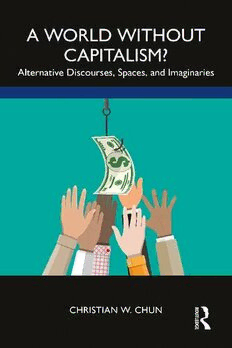Table Of ContentA WORLD WITHOUT CAPITALISM?
Inthisbook,ChristianW.Chunexaminesthewaysinwhich identities,discourses,
and topographies of both capitalist and anti-capitalist imaginaries and realities are
embodied in the everyday practices of people. A World without Capitalism? is a
sociolinguistic ethnography that explores the heretofore limited research in applied
linguisticsandsociolinguisticsonthediscursiveandmaterializedrepresentationsand
enactments of capitalism.
Engagingacrossdisciplinaryfields,includingappliedlinguistics,ethnography,poli-
tical economy, philosophy, and cultural studies, Chun investigates in ethnographic
detail howcapitalism doesand doesnotpervade people’s everydayexperiences.This
book aims to further contribute to a much-needed understanding of how discourses
operate inthe co-constructionsofcapitalistand anti-capitalistimaginariesand instan-
tiated realities and practices as narrated, lived, and embodied by people and material
artifacts.
This book is vital reading for students and researchers working in the fields of
applied linguistics, discourse analysis, and cultural studies, as well as those interested
in understanding capitalism and questioning how to live beyond it.
Christian W. Chun is Associate Professor in the Department of Applied Lin-
guistics, University of Massachusetts Boston. He is the author of Power and Meaning
Making in an EAP Classroom:Engaging with the Everyday (2015) and The Discourses of
Capitalism: Everyday Economists and the Production of Common Sense (2017).
A WORLD WITHOUT
CAPITALISM?
Alternative Discourses, Spaces, and
Imaginaries
Christian W. Chun
Firstpublished2022
byRoutledge
2ParkSquare,MiltonPark,Abingdon,OxonOX144RN
andbyRoutledge
605ThirdAvenue,NewYork,NY10158
RoutledgeisanimprintoftheTaylor&FrancisGroup,aninformabusiness
©2022ChristianW.Chun
TherightofChristianW.Chuntobeidentifiedasauthorofthisworkhasbeen
assertedinaccordancewithsections77and78oftheCopyright,Designsand
PatentsAct1988.
Allrightsreserved.Nopartofthisbookmaybereprintedorreproducedor
utilisedinanyformorbyanyelectronic,mechanical,orothermeans,now
knownorhereafterinvented,includingphotocopyingandrecording,orinany
informationstorageorretrievalsystem,withoutpermissioninwritingfromthe
publishers.
Trademarknotice:Productorcorporatenamesmaybetrademarksorregistered
trademarks,andareusedonlyforidentificationandexplanationwithoutintentto
infringe.
BritishLibraryCataloguing-in-PublicationData
AcataloguerecordforthisbookisavailablefromtheBritishLibrary
LibraryofCongressCataloging-in-PublicationData
Acatalogrecordhasbeenrequestedforthisbook
ISBN:978-1-138-60534-3(hbk)
ISBN:978-1-138-60536-7(pbk)
ISBN:978-1-003-24104-1(ebk)
DOI:10.4324/9781003241041
TypesetinBembo
byTaylor&FrancisBooks
CONTENTS
List of figures vi
Acknowledgments vii
1 A world without capitalism? 1
2 The spectral realities of capitalism 23
3 What’s in a name: working or ‘middle’ class? 46
4 The crucial role of race in American capitalism 66
5 “Working for the clampdown” 89
6 Workplaces, the city, and the world 109
7 The socio-spatialities of capital: urban landscapes and alternative
imaginaries 131
8 What is to be done? 161
References 169
Index 185
FIGURES
4.1 Sign at a Defund the Police rally, June 2020, Boston City
Hall 87
7.1 The Lucas, South End, Boston 134
7.2 Behind The Lucas, South End, Boston 135
7.3 “Coal Office” 1, Kings Cross, London 139
7.4 “Coal Office” 2, Kings Cross, London 139
7.5 Graffiti 1, Camden Town, London 141
7.6 Graffiti 2, Camden Town, London 142
7.7 Graffiti 3, Kentish Town, London 142
7.8 345 Harrison, Shawmut neighborhood, Boston 145
7.9 “Meatland,” Jamaica Plain neighborhood, Boston 146
7.10 Condominium, South End neighborhood, Boston 147
7.11 “The Social Type,” Silver Lake neighborhood, Los Angeles 149
7.12 Traditional stores in Los Angeles 150
7.13 Echo Park Lake, Los Angeles 152
7.14 Sign near City Hall, Los Angeles 152
7.15 Graffiti on statue of John Endecott 154
7.16 Terminal 2, Logan International Airport, Boston 155
7.17 Mural 1, Pershing Square, downtown Los Angeles 157
7.18 Mural 2, Pershing Square, downtown Los Angeles 158
7.19 Graffiti, Orange Line, Boston 159
7.20 Graffiti, Heathrow Express, London 159
ACKNOWLEDGMENTS
I would first like to thank my publisher, Routledge, for inviting me to write
this follow-up book to The Discourses of Capitalism. I also thank the participant
interviewees that are featured in this book, and the graduate assistants in the
Department of Applied Linguistics, University of Massachusetts Boston, who
helped transcribe these interviews. In addition, I thank John Wiley and Sons
for their permission to use my 2019 article that appeared in the Journal of
Sociolinguistics, 23(4), entitled “Language, discourse, and class: What’s next for
sociolinguistics?,” which has been amended and expanded in Chapter 3. I also
thank Diggit Magazine for allowing me to use the published columns of mine
throughout this book.
Especially in this past year and a half of the pandemic, there have been many
people who gave me the love and support I needed to not only carry on with my
life, but also encouraged me to finish this book; in particular, my sister Lorraine,
myniece Claire, mynephewKevin,and several dear friendsand colleagues around
the world who have always supported me and my work, including the late Jan
Blommaert.
I dedicate this book to my late mother, Betty L. Chun, who taught me how to
read and write before I started kindergarten, and encouraged my learning and love
of both. Thank you, Mom.
1
A WORLD WITHOUT CAPITALISM?
Capitalism is the crisis
In 2018, I posted the following quote by Arundhati Roy (2003) on my social
mediapage:“Anotherworldisnotonlypossible,sheisonherway.Onaquietday,
I can hear her breathing” (p. 8). A good friend of mine replied to the post, “Well
then, she better hurry the fuck up!” Can we imagine a world without the socio-
economic and politically enabled system known as capitalism? A society that is no
longer co-created, permeated, and indeed, invaded by the social, cultural, political,
ideological, and discursive enabling domains that work in tandem to co-construct,
support, perpetuate, and justify a capitalist-run and dominated economy? Can our
world evenexist without capitalism?Inasmuch ascapitalism “existsinpartbecauseit
inhabits our minds and hearts: we breathe its culture everyday” (Adamovsky, 2011,
p.43),isitpossibletofreeourselvesfromitinourlifetime?Perhapsbyframingthese
questions in positing there is only ‘one’ world, it may inadvertently enable abject
resignationandfrustrationamongthoseofuswhoyearnforalifebeyondandfreeof
capitalism with all its exploitations.
Why even bother asking these questions? Are they futile or even foolhardy?
There are a number of reasons why, many of which will be elaborated throughout
this book, but the most pressing one in my opinion – and not only my opinion,
but that of the overwhelming majority in the scientific community worldwide – is
that prior to the time of this writing, it has been estimated by scientists that we
havelessthan12yearstolimitcatastrophicclimatechangethatwillendangermany
species including our own (Watts, 2018) with our extinction as a possible or even
probable outcome. However, this estimation has now been recently revised by
some to a mere 18 months as of June 2019 (McGrath, 2019). Our lives have
become increasingly more endangered by the rapid and dire changes to our
environment, dramatically evidenced in the recent wildfires around the world due
DOI:10.4324/9781003241041-1

